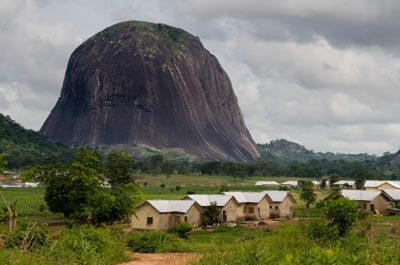(单词翻译:单击)
情景对话
Todd: So Carla, you lived in Africa.
托德:卡拉,你曾在非洲生活过。
Carla: We got married in Africa.
卡拉:我们是在非洲结的婚。
Todd: Wow.
托德:哇。
Carla: And we moved to Nigeria. As I told you before, we got married in Ghana, and we moved to Nigeria. And our kids were born in Nigeria. But I wanna tell you a little bit about before our kids were born, because we lived in a place, a small small village that had no running water, no electricity, we could buy fresh food once a week. That means there were no toilettes, so the people used the rocks and the bushes around the village. Maybe that's too graphic, is that too graphic?
卡拉:然后我们搬到了尼日利亚。就像我之前跟你说的,我们是在加纳结的婚,之后搬去了尼日利亚。我们的孩子是在尼日利亚出生的。不过我想谈谈我孩子出生之前的事情,因为我们住在一个小乡村,那里没有自来水、没有电,我们一周可以买一次新鲜的食物。这意味着那里也没有卫生间,所以人们就去乡村里的岩石和灌木丛里解决。也许太形象了,你会觉得过于形象吗?
Todd: No no no no.
托德:不,没有,不会,不会。
Carla: And, we had to pump our water out of a well. And at night we would pump one bucket full of water, and it would be half full of silt by the next morning the kind of muddy silt would have sunk to the bottom. And then we would pour off the clear water off the top. And it was a bad drought year in 1976. And we had to, we would cook our vegetables and then drain off the water and then use the water, reuse the water to wash the dishes and even to wash our clothes. And we had just enough water to... Fresh water we kept for drinking. Washing ourselves, washing our vegetables, cooking, washing the dishes, we used, reused vegetable water. And I had, we had no electricity so I cooked a stew once a week. And twice or three times a day I had to, we had to heat the stew up again, boil it to kill all the germs. Otherwise, it would've poisoned us.
卡拉:我们要从井里打水。晚上我们会打满一桶水,而第二天早上可能就会有半桶的淤积,这些淤积都沉到了桶底。之后我们要倒出上面的干净水。1976年是旱灾特别严重的一年。我们炒菜的时候会把水分排出去,然后再利用这些水洗碗,甚至是洗衣服。我们要留出足够的水清水用来饮用。而洗澡、洗衣服、做饭、洗碗,我们就会重新利用蔬菜的水分。那里没有电,所以我一周做一次炖菜。一天有两三次我们都必须把炖菜热一热,让炖菜煮沸以杀死细菌。不然的话,这些细菌会让我们中毒。
Todd: Man.
托德:天啊。
Carla: But in that year that we lived there, I think we were healthier than we had ever been before, or since.
卡拉:不过那年我们生活在那里的时候,我觉得我比以任何时候都健康。

译文属可可原创,仅供学习交流使用,未经许可请勿转载
重点讲解
重点讲解:
1. be full of
有大量…的;满是…的;
eg. The puddle is full of water.
水坑里充满了水。
eg. His heart is full of misgivings.
他心中疑虑重重。
2. drain off
把(某地的水)排干;使流出;使流向别处;
eg. Drain off any remaining water.
把剩下的水排干。
eg. The ridged design of the pan allows excess fat to drain off.
平底锅的凸纹设计使多余的油能够控出。
3. heat up
(尤指将已经冷掉的熟食)加热;
eg. You'd better heat up the tomato soup.
你最好把蕃茄汤热一下。
eg. Please heat up the cold meat for supper.
请把冷肉热一下,吃晚饭用。


